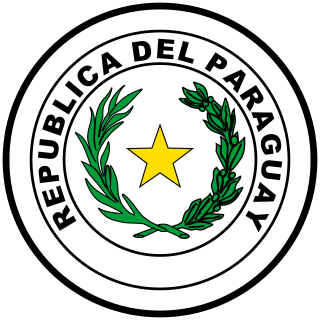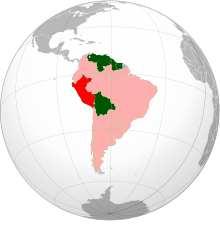
Paraguayan foreign policy has concentrated on maintaining good relations with its neighbors, and it has been an active proponent of regional co-operation. It is a member of the United Nations and has served one term in the UN Security Council in 1967-1969. It maintains membership in several international financial institutions, including the World Bank, the Inter-American Development Bank, and the International Monetary Fund. It also belongs to the Organization of American States, the Latin American Integration Association (ALADI), the Rio Group, INTERPOL, MERCOSUR and UNASUR.

The history of South America is the study of the past, particularly the written record, oral histories, and traditions, passed down from generation to generation on the continent of South America. The continent continues to be home to indigenous peoples, some of whom built high civilizations prior to the arrival of Europeans in the late 1400s and early 1500s. South America has a history that has a wide range of human cultures and forms of civilization. The Caral Supe civilization, also known as the Norte Chico civilization in Peru is the oldest civilization in the Americas and one of the first six independent civilizations in the world; it was contemporaneous with the Egyptian pyramids. It predated the Mesoamerican Olmec by nearly two millennia.

The Andean Community is a free trade area with the objective of creating a customs union comprising the South American countries of Bolivia, Colombia, Ecuador, and Peru. The trade bloc was called the Andean Pact until 1996 and came into existence when the Cartagena Agreement was signed in 1969. Its headquarters are in Lima, Peru.

The Rio Group (G-Rio) was a permanent association of political consultation of Latin America and Caribbean countries, created in Rio de Janeiro, Brazil on December 18, 1986 with the purpose of creating a better political relationship among the countries. It was succeeded in 2011 by the Community of Latin American and Caribbean States.

The Inter-American Treaty of Reciprocal Assistance is an intergovernmental collective security agreement signed in 1947 in Rio de Janeiro among many countries of the Americas.

The Union of South American Nations (USAN), sometimes also referred to as the South American Union, abbreviated in Spanish as UNASUR and in Portuguese as UNASUL, is an intergovernmental regional organization set up by Hugo Chavez to counteract the influence of the United States in the region. It once comprised twelve South American countries; as of 2019, most have withdrawn.

ALBA or ALBA–TCP, formally the Bolivarian Alliance for the Peoples of Our America or the Bolivarian Alliance for the Peoples of Our America – Peoples' Trade Treaty, is an intergovernmental organization based on the idea of political and economic integration of Latin American and Caribbean countries.
The UNASUR Constitutive Treaty, officially the Constitutive Treaty of the Union of South American Nations, was signed on May 23, 2008 during the extraordinary summit of heads of state and government of the Union of South American Nations (UNASUR) held in Brasília, Brazil. It officially established the Union of South American Nations, an intergovernmental continental union of all twelve South American nations.

The pink tide, or the turn to the left, is a political wave and turn towards left-wing governments in Latin America throughout the 21st century. As a term, both phrases are used in political analysis in the news media and elsewhere to refer to a move toward more economic progressive or social progressive policies in the region. Such governments have been referred to as "left-of-centre", "left-leaning", and "radical social-democratic". They are also members of the São Paulo Forum, a conference of left-wing political parties and other organizations from the Americas.

The I Beach South American Games was a multi-sport event held from 2 to 13 December 2009 in Montevideo and Punta del Este, Uruguay. The Games was organized by the South American Sports Organization (ODESUR).
The Summit of South American-Arab Countries is a bi-regional mechanism for cooperation and political coordination, which gathers the 22 member-States of the League of Arab States and the 12 countries of South America. Better known by its Portuguese and Spanish acronym ASPA, the bi-regional forum was created upon proposal of the Brazilian President Luiz Inácio Lula da Silva, during the I ASPA Summit of Heads of State and Government, held in Brasilia, Brazil, in May 2005. Since its inception, a second ASPA Summit happened in Doha, Qatar, in March 2009, and a third Summit was held in Lima, Peru, in October 2012, after being postponed, from February 2011, due to the Arab Spring uprisings.

The 2010 South American summit, took place in Georgetown, Guyana on November 26, 2010. Eight heads of state and four foreign ministers of the Union of South American Nations attended the summit. During the summit, the leaders signed an additional protocol to the Constitutive Treaty, adding a democratic clause to the charter of the organization. The Georgetown summit ended with the Ecuadorian president handing the UNASUR pro-tempore presidency for the next twelve months to his Guyanese counterpart, Bharrat Jagdeo.

Most visitors to Ecuador can enter the country without a visa. However, visitors from certain countries must first obtain a visa in advance before being allowed to enter.

Currently, Mercosur is composed of five full members, five associated countries and two observer countries:
The 2003 South American Youth Championship is a football competition contested by all ten U-20 national football teams of CONMEBOL. The tournament was held in Uruguay between 4 and 28 January 2003, it was the 21st time the competition has been held and the second to take place in Uruguay. Argentina won their fourth trophy.
The 17th South American Youth Championships in Athletics were held at the Estadio Modelo in Guayaquil, Ecuador from September 25–26, 2004.
The 4th South American Under-23 Championships in Athletics were held in Medellín, Colombia, at the Estadio Alfonso Galvis Duque at the Unidad Deportiva Atanasio Girardot on March 20–23, 2010. The championships, organized by CONSUDATLE, were held as a part of the South American Games. A detailed report on the results was given. The most prominent result was achieved in the heat of the women's 100 metres by Ana Cláudia Lemos Silva. Her time of 11.17 equaled the South American and Brazilian record, and set a new championships and games record.

The Forum for the Progress and Integration of South America is an initiative by Sebastián Piñera and Iván Duque, for the creation of an integration body to replace the Union of South American Nations.

Brazil and Venezuela maintain diplomatic relations.

The 2023 South American summit was a summit organized and hosted by the government of Brazil "to deal with the importance of seeking collective solutions in the name of a common destiny and to reposition the region as an important actor on the global stage". The summit was held on May 30, 2023, in the city of Brasília.















